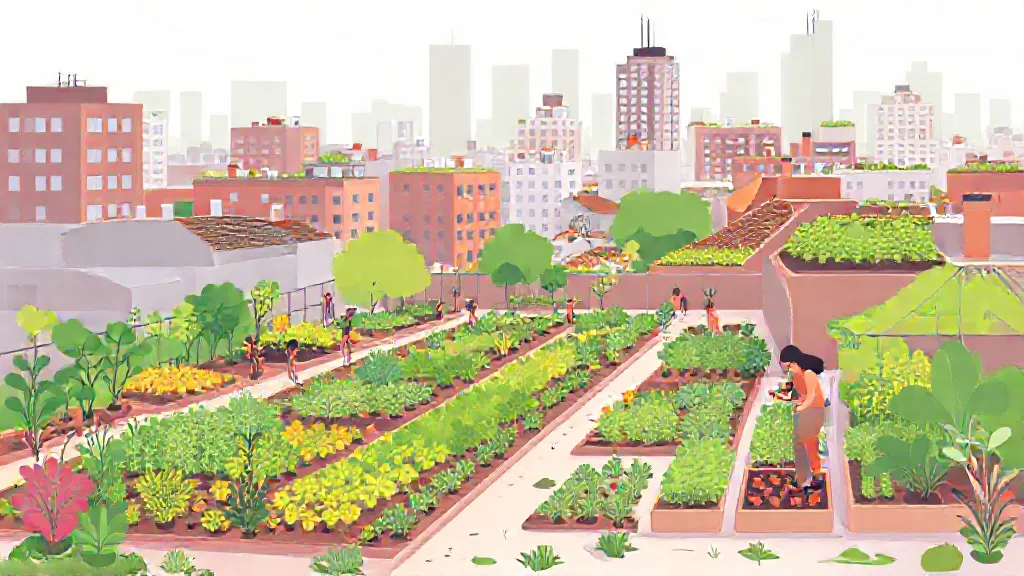Urban farming has emerged as a significant trend in recent years, driven by a confluence of environmental, economic, and social factors. As urban populations continue to swell, cities are increasingly recognizing the need for sustainable food production methods that can alleviate issues such as food deserts, carbon footprints, and urban heat islands. This article delves into the reasons behind the growing popularity of urban farms and their potential to reshape our cities.
Urbanization and Food Security
The rapid urbanization of the global population has created challenges in food security. With more people living in cities than ever before, the demand for fresh, locally-sourced food has surged. Urban farms provide a viable solution by producing food closer to where it is consumed, reducing transportation costs and emissions.
They also help mitigate food deserts—areas with limited access to affordable and nutritious food—by creating community gardens and small-scale farms that offer fresh produce to local residents.
Environmental Benefits
Urban farms are not just about food production; they also play a crucial role in enhancing urban ecosystems. By incorporating green spaces into cityscapes, urban farms help improve air quality, reduce urban heat, and promote biodiversity.
They serve as habitats for various species, including pollinators like bees and butterflies, which are essential for maintaining healthy ecosystems. Furthermore, urban farms often utilize sustainable practices such as composting, rainwater harvesting, and organic farming, contributing to overall environmental health.
Economic Opportunities
The growth of urban farms has also spurred economic opportunities within cities.
By creating jobs in agriculture, food processing, and distribution, urban farming initiatives can stimulate local economies. Many urban farms operate as cooperatives or social enterprises, providing employment and training for marginalized communities. Additionally, the rise of farmers' markets and local food networks has enabled urban farmers to sell their products directly to consumers, enhancing their financial viability and fostering community connections.
Community Engagement and Education
Urban farms serve as vital community hubs that promote engagement and education. They offer workshops, volunteer opportunities, and school programs that educate residents about sustainable agriculture, nutrition, and environmental stewardship. These initiatives not only empower individuals with knowledge but also foster a sense of community and belonging.
By involving residents in the farming process, urban farms help cultivate a deeper appreciation for food sources and encourage healthier eating habits.
Technological Innovations in Urban Farming
The integration of technology into urban farming practices has further accelerated its growth. Innovations such as vertical farming, hydroponics, and aquaponics allow for efficient food production in limited spaces.
These technologies enable urban farmers to maximize yield while minimizing resource use, making urban agriculture more sustainable. Additionally, advancements in data analytics and smart farming tools help farmers monitor crop health and optimize growing conditions, leading to increased productivity.
Policy Support for Urban Agriculture
Government policies and initiatives have played a significant role in promoting urban farming.
Many cities have implemented zoning changes, grant programs, and tax incentives to support urban agriculture. These policies aim to facilitate the establishment of community gardens, rooftop farms, and other agricultural ventures within urban areas. By providing resources and support, local governments can help ensure the long-term viability of urban farms and their contributions to food security and sustainability.
Cultural Shifts Towards Local Food
The growing trend of farm-to-table dining and the increasing consumer preference for locally-sourced food have also contributed to the rise of urban farms. As people become more aware of the environmental and health impacts of industrial agriculture, they are seeking alternatives that prioritize sustainability and community well-being. Urban farms cater to this demand by providing fresh, organic produce that supports local economies and reduces the carbon footprint associated with food transportation.
Future of Urban Farming
Looking ahead, the future of urban farming appears promising. As cities continue to grapple with the challenges posed by climate change, population growth, and food security, urban farms will likely play an increasingly important role in shaping sustainable urban landscapes. Continued investment in urban agriculture, coupled with community engagement and technological advancements, will be essential for realizing the full potential of urban farms as a solution to some of the most pressing issues facing our cities today.
